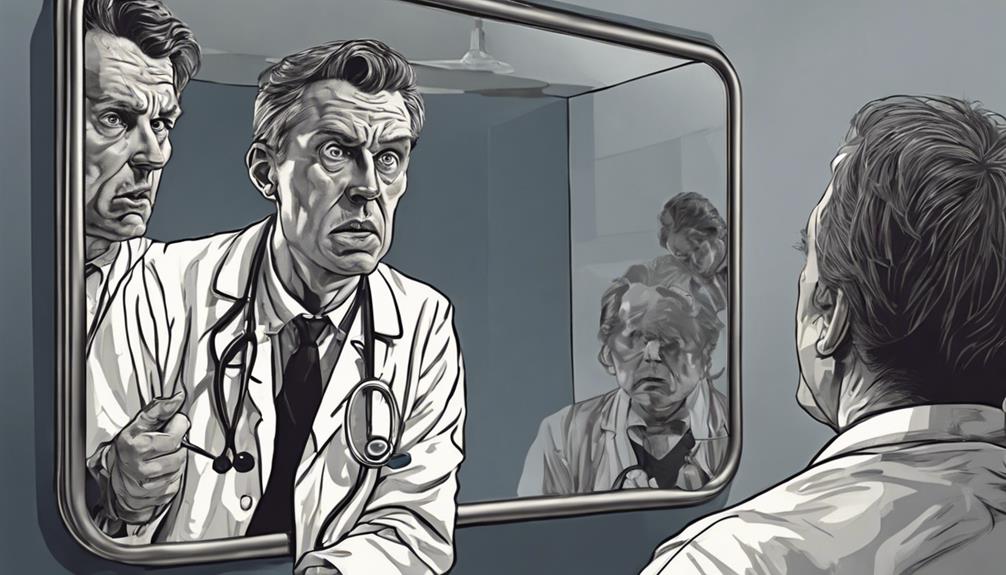Have you ever left a doctor’s appointment feeling a bit uneasy, like something wasn’t quite right?
It's essential for us to be aware of the signs of narcissistic behavior in healthcare providers. Understanding how to spot these traits can make a significant difference in our medical care.
By being able to identify red flags early on, we can safeguard our well-being and ensure a positive patient-doctor relationship.
Key Takeaways
- Recognize red flags like grandiose self-perception and lack of empathy
- Document interactions and seek second opinions for protection
- Report unethical behavior to medical boards promptly
- Prioritize well-being by switching to a new healthcare provider if needed
Recognizing Narcissistic Traits in Doctors
Recognizing narcissistic traits in doctors can be crucial for ensuring patients receive ethical and compassionate care. As patients, we deserve to be treated with respect and dignity, and being able to identify signs of narcissism in healthcare providers is essential for our well-being.
By paying attention to red flags such as a grandiose self-perception, a constant need for praise, or a lack of empathy towards us, we can protect ourselves from potential harm. It's important to trust our instincts and seek support if we feel manipulated or mistreated.
Ultimately, being aware of these traits can empower us to advocate for our own health and seek out healthcare professionals who prioritize our best interests.
Understanding the Impact on Patients

Understanding the impact on patients requires a deep dive into the psychological and physical repercussions of being under the care of a narcissistic doctor. Patients may find themselves facing misdiagnoses, unnecessary treatments, and emotional manipulation.
The shattered trust and confidence in the medical profession can lead to long-lasting psychological effects. Additionally, negligent care from a narcissistic doctor could result in physical harm.
It's essential for patients to recognize these signs and advocate for their well-being. Seeking a second opinion, documenting interactions, and reporting unethical behavior are crucial steps in protecting oneself.
Strategies for Dealing With Narcissistic Doctors
When confronted with a narcissistic doctor, patients should prioritize their well-being by implementing effective strategies to navigate the challenging dynamics of such interactions. Seeking a second opinion from another healthcare provider can offer fresh insights and potentially better care.
Documenting all interactions and medical decisions helps in keeping track of treatments and ensuring accountability. Reporting unethical behavior to medical boards or authorities is crucial for the safety of other patients and upholding ethical standards.
Focusing on self-care and seeking emotional support can aid in managing the stress and emotional toll of dealing with a narcissistic doctor. Considering switching to a new healthcare provider who values empathy and professionalism may lead to a more positive and supportive healthcare experience.
Risks of Narcissistic Doctors in Healthcare

What impact do narcissistic doctors have on the quality of healthcare and patient outcomes? Narcissistic doctors pose significant risks to both healthcare quality and patient well-being. Their lack of empathy, constant need for admiration, and manipulative behavior can lead to misdiagnoses, unnecessary treatments, and emotional manipulation. This can result in shattered patient trust, long-lasting psychological effects, and even physical harm due to negligent care. Below is a table highlighting the risks and consequences of having narcissistic doctors in healthcare:
| Risks and Consequences | Description |
|---|---|
| Erosion of trust | Breakdown in the patient-doctor relationship |
| Negative impact on healthcare quality | Decreased standard of care and treatment outcomes |
| Legal implications | Potential malpractice cases and lawsuits |
It is crucial for patients to be aware of these risks and take steps to protect themselves from the detrimental effects of narcissistic doctors.
Protecting Yourself as a Patient
To safeguard your well-being as a patient, it's imperative to recognize the red flags associated with narcissistic behavior in healthcare providers. Here are some key steps to protect yourself:
- Trust Your Instincts: If something feels off in your interactions with a healthcare provider, don't dismiss it. Trust your gut feelings and seek a second opinion if needed.
- Stay Informed: Educate yourself about your health conditions, treatment options, and expected outcomes. Being knowledgeable empowers you to ask the right questions and make informed decisions.
- Establish Boundaries: Set clear boundaries with your doctor regarding treatment plans, communication preferences, and respect for your autonomy. Healthy boundaries help maintain a positive patient-doctor relationship.
Reporting and Seeking Support

In navigating the challenges posed by narcissistic doctors, understanding the importance of reporting unethical behavior and seeking support is crucial for protecting both individual patients and the integrity of the healthcare system.
When faced with a doctor exhibiting narcissistic traits, it's essential to document any concerning interactions and medical decisions. Reporting such behavior to the relevant medical boards or authorities is a proactive step towards ensuring patient safety and holding healthcare professionals accountable.
Additionally, seeking emotional support and considering switching to a new healthcare provider can safeguard your well-being in the face of manipulative or exploitative practices. By taking these actions, patients contribute to maintaining high standards of care and upholding the trust that's fundamental to the patient-doctor relationship.
Safeguarding Patient Rights and Well-being

When faced with narcissistic doctors, safeguarding patient rights and well-being becomes paramount in ensuring optimal healthcare outcomes and maintaining trust within the medical system.
- Advocate for Yourself: Communicate openly about your concerns and assert your rights as a patient.
- Seek Support: Reach out to patient advocacy groups or trusted healthcare professionals for guidance and assistance.
- Document Everything: Keep detailed records of your interactions, treatments, and any red flags to protect yourself and others from potential harm.
Frequently Asked Questions
Can Narcissistic Doctors Be Rehabilitated or Trained to Change Their Behavior?
We believe that narcissistic doctors can be challenging to rehabilitate due to their deep-rooted behaviors. Change is possible with intensive therapy and self-awareness, but it's a complex process that requires genuine commitment.
However, not all may be willing to change. It's crucial for healthcare systems to prioritize patient safety and well-being by closely monitoring such doctors and taking appropriate actions to ensure quality care.
How Do Narcissistic Doctors Typically Interact With Their Colleagues and Medical Staff?
Narcissistic doctors often display domineering behavior towards colleagues and staff. They may belittle or manipulate others to maintain their perceived superiority. Communication tends to be one-sided, lacking empathy and genuine collaboration.
Team dynamics suffer, impacting patient care and overall morale. Recognizing these patterns is crucial to fostering a supportive work environment and ensuring quality healthcare delivery.
Addressing these issues collectively can help mitigate the harmful effects of narcissistic behavior in medical settings.
Are There Any Specific Warning Signs or Red Flags That Patients Should Watch Out for When Dealing With a Narcissistic Doctor?
When dealing with a narcissistic doctor, watch for warning signs like grandiosity, lack of accountability, and exploitative behavior. These red flags can lead to misdiagnosis, emotional manipulation, and shattered trust.
Take steps to protect yourself by seeking a second opinion, documenting interactions, and reporting unethical behavior. Prioritize self-care and consider finding a new healthcare provider for better support.
Stay vigilant for these signs to safeguard your well-being.
What Are the Potential Long-Term Consequences for Patients Who Have Been Subjected to Narcissistic Behavior by Their Healthcare Providers?
When dealing with narcissistic doctors, patients can suffer long-term consequences such as psychological trauma, mistrust in healthcare, and even physical harm from negligent care. It's crucial to seek support, document interactions, and consider switching healthcare providers for better care.
The impact of such behavior goes beyond the individual, affecting overall healthcare quality and eroding patient-doctor trust. Reporting unethical behavior can help protect others and hold these providers accountable.
How Do Healthcare Institutions and Medical Boards Address Complaints and Reports of Narcissistic Behavior in Doctors?
When addressing complaints about narcissistic behavior in doctors, healthcare institutions and medical boards must take decisive action. They should thoroughly investigate reports, ensuring patient safety and trust.
Transparency and accountability are crucial in upholding medical standards. By swiftly addressing such issues, these bodies can protect patients and maintain the integrity of the healthcare system.
It's essential to prioritize patient well-being and hold healthcare professionals to the highest ethical standards.
How Can Patients Identify Narcissistic Behavior in Doctors?
Identifying narcissistic behavior in doctors becomes crucial in ensuring patients receive proper care. Narcissists often exhibit manipulative tendencies, focusing solely on their own needs. Patients should be aware of red flags such as doctors constantly dismissing concerns or belittling their symptoms. Recognizing these patterns can prevent patients from falling victim to narcissists and fabricated illnesses, ultimately safeguarding their well-being.
Conclusion
In conclusion, when it comes to healthcare, it's crucial to remember the old adage, 'Trust, but verify.' By being vigilant and informed, we can protect ourselves from the potential harm of narcissistic doctors. Recognizing the red flags, advocating for our well-being, and seeking support when needed are essential steps in ensuring quality care.
Let's empower ourselves to navigate the healthcare landscape with confidence and prioritize our health above all else.










